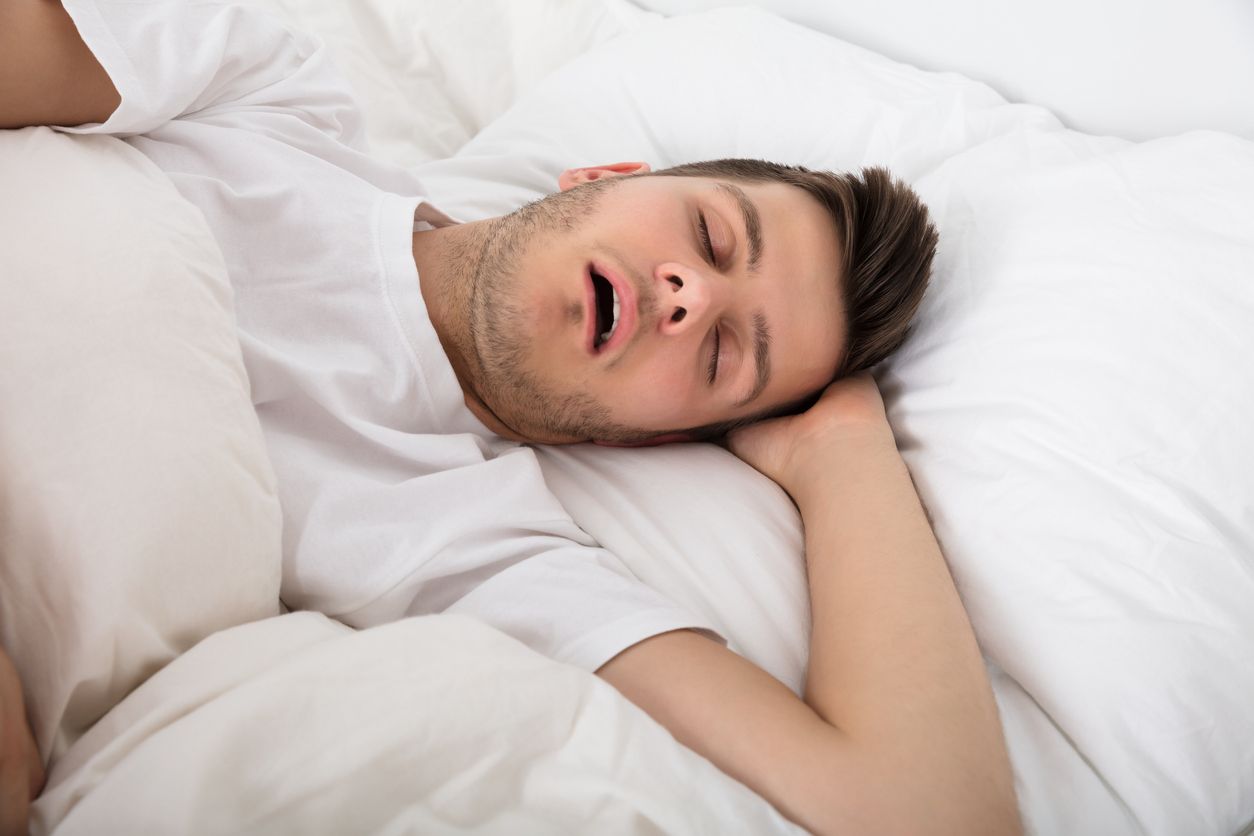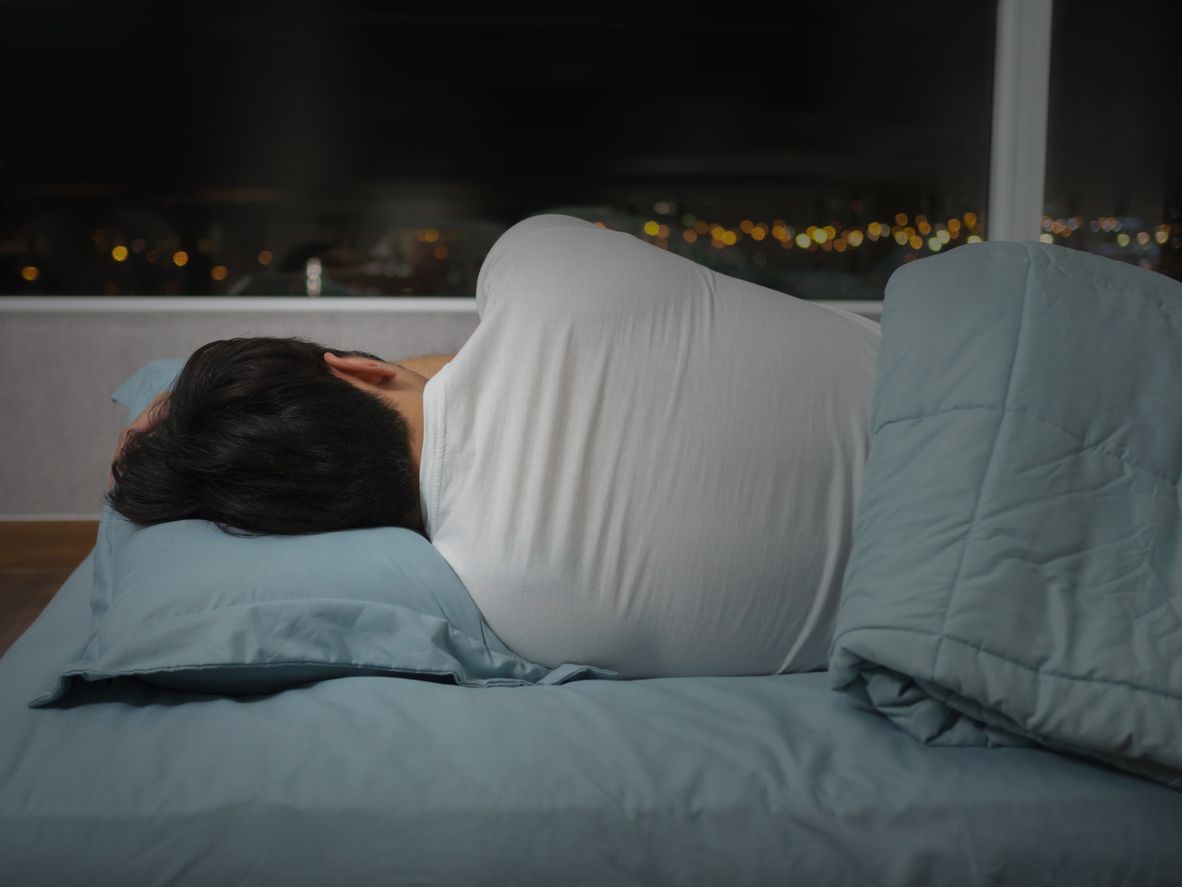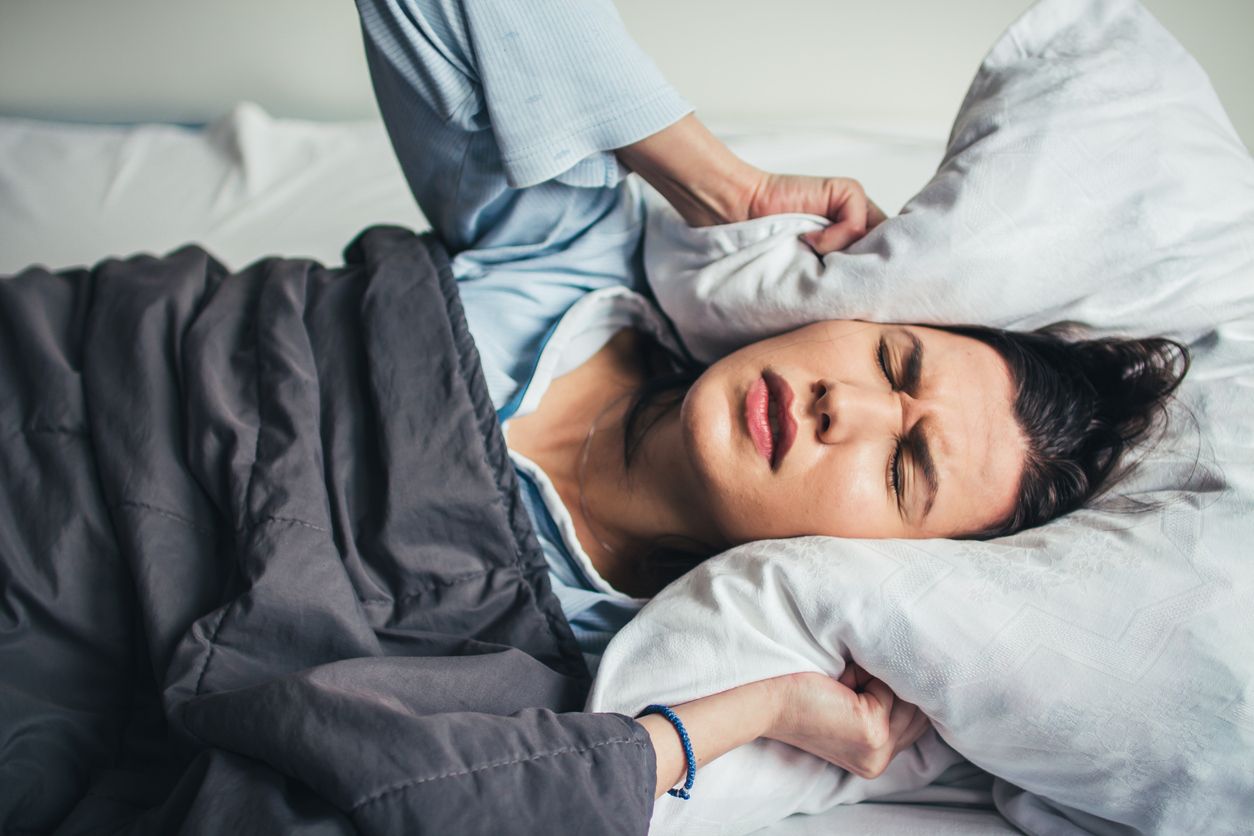- Home
- Trend
- Weight Loss Strategies
- Acne Tips
- Hair Health Information
- Blemish Removal Tips
- Acne Scar Removal Tips
- Muscle Building Techniques
- Intimate Care Tips
- Postpartum Intimate Care
- Eye Bags Wiki
- Tips for Face Slimming
- Secret of Permanent Hair Removal
- Breast Enlargement Tips
- Cure to Snoring
- Marionette Lines
- Skin-Tightening Secrets
Snoring is a common phenomenon that can be exacerbated by extreme fatigue. Many people notice that their snoring intensifies after a long, exhausting day, affecting not only their sleep quality but also that of their bed partners. This blog delves into the reasons why snoring happens more frequently when you are extremely tired, exploring the underlying mechanisms and offering insights into how to mitigate this issue.
General Snoring Reasons: Who is More Likely to Snore?

Before we get there, you should know that snoring happens when the airflow through the mouth and nose is partially blocked during sleep, causing the surrounding tissues to vibrate. This vibration results in the familiar snoring sound.
• Relaxation of Throat Muscles: During sleep, the muscles in the throat naturally relax. However, when a person is extremely tired or fatigued, these muscles can become excessively relaxed. This excessive relaxation increases the likelihood of airway obstruction, leading to snoring. Individuals who experience significant fatigue or exhaustion are thus more likely to snore due to the greater relaxation of their throat muscles.
• Tongue Position: The position of the tongue during sleep plays a crucial role in snoring. When a person lies down, especially on their back, the tongue can fall back into the throat. This is particularly true when someone is very fatigued. The tongue’s backward position further narrows the airway, creating an obstruction that results in snoring. People who are overweight or have larger tongues are also more prone to this issue.
• Throat and Nasal Congestion: Congestion in the throat and nasal passages can significantly contribute to snoring. When a person is tired, they may experience heightened sensitivity to allergens or have a reduced ability to keep their airways clear. This leads to increased throat and nasal congestion, which narrows the airway and increases the likelihood of snoring. Conditions such as allergies, colds, or sinus infections can exacerbate this issue.
• Anatomical Factors: Certain anatomical characteristics can make individuals more likely to snore. These include having a thick neck, enlarged tonsils, a deviated nasal septum, or a naturally narrow airway. People with these features are predisposed to airway obstruction during sleep, making snoring more common.
• Age: As people age, the muscle tone in their throat decreases, which can lead to increased snoring. The natural ageing process causes the tissues in the throat to become looser and more prone to collapsing during sleep, resulting in snoring.
• Gender: Men are more likely to snore than women. This disparity is often due to differences in anatomy and fat distribution. Men tend to have narrower airways and carry more fat around their necks, both of which can contribute to snoring. However, post-menopausal women are more likely to snore due to hormonal changes that affect muscle tone and fat distribution.
• Weight: Excess body weight, especially around the neck and throat, can increase the risk of snoring. Extra fatty tissue in these areas can put pressure on the airway, causing it to narrow and leading to snoring. Weight loss can often reduce or eliminate snoring in overweight individuals.
• Lifestyle Factors: Certain lifestyle choices, such as alcohol consumption and the use of sedatives, can exacerbate snoring. Alcohol and sedatives relax the muscles in the throat, increasing the likelihood of airway obstruction. Smoking can also irritate the airways, causing inflammation and congestion that contribute to snoring.
Why Extreme Fatigue Increases Snoring?

Several factors explain why extreme fatigue can lead to more frequent and intense snoring:
Deeper Sleep
When you are extremely tired, your body often compensates by entering the deeper stages of sleep more quickly and for longer periods. These stages, particularly the deep sleep stage, are essential for physical and mental recovery. However, during deep sleep, the muscle tone throughout the body is significantly reduced.
This includes the muscles in the throat and airway. The increased relaxation and reduced muscle tone can cause the soft tissues in the throat, such as the uvula and soft palate, to collapse and vibrate more easily as air passes through. This vibration is what produces the sound of snoring. Therefore, the more profound the level of sleep, the more relaxed the muscles become, increasing the likelihood and intensity of snoring.
Compromised Muscle Tone
Extreme fatigue can lead to a notable reduction in the tone of the muscles, not just during sleep but also throughout the day. When the muscles in the throat and tongue are overly relaxed, they are more prone to collapse and obstruct the airway during sleep. This compromised muscle tone means that the airway is narrower, making it more difficult for air to pass through smoothly.
The result is an increased risk of snoring, as the relaxed muscles and soft tissues vibrate against each other. This is particularly noticeable in individuals who are already predisposed to snoring due to other factors such as age, weight, or anatomical variances..
Increased Need for Recovery
After an exceptionally tiring day, your body is in greater need of restorative sleep to repair and rejuvenate. This increased need for recovery can lead to heavier and more laboured breathing during sleep. When the body is fatigued, it often takes in deeper breaths to supply the necessary oxygen for recovery processes.
This deeper breathing can create a stronger airflow through a relaxed and potentially obstructed airway, increasing the chances of snoring. Additionally, the combination of deeper sleep stages and compromised muscle tone can exacerbate the problem, making the snoring not only more frequent but also louder and more disruptive.
免費體驗
Fotona 4D NightLase Snoring Treatment
1 Minute Self-Registration
Date should not be before minimal date
Health Risks Associated with Snoring Due to Fatigue

Snoring is not just a nuisance; it can have significant health implications, especially when linked to extreme fatigue:
Sleep Apnea
Snoring can be a prominent symptom of obstructive sleep apnea (OSA), a serious sleep disorder characterised by repeated episodes where the airway becomes partially or completely blocked during sleep. These blockages lead to temporary pauses in breathing, which can last for several seconds and occur multiple times throughout the night.
Each pause in breathing reduces the oxygen levels in the blood, causing the brain to momentarily wake the sleeper to reopen the airway. This disruption in sleep prevents the person from reaching the restorative stages of sleep, leading to poor sleep quality and extreme fatigue. If left untreated, sleep apnea can have severe health consequences, including cardiovascular issues, metabolic disorders, and an increased risk of accidents due to excessive daytime sleepiness.
Daytime Fatigue
Poor sleep quality resulting from snoring and frequent awakenings can lead to excessive daytime sleepiness. Individuals may struggle to stay awake and alert during the day, which can significantly impact their performance at work or school, their ability to drive safely, and their overall quality of life. Daytime fatigue can also lead to mood disturbances, such as irritability, depression, and anxiety, further affecting one’s ability to function effectively.
Over time, the cumulative effects of poor sleep can lead to chronic fatigue syndrome, where individuals experience persistent tiredness that is not relieved by rest, severely impacting their physical and mental health.
Cardiovascular Issues
Chronic snoring and untreated sleep apnea are associated with a higher risk of developing cardiovascular problems. The repeated episodes of low oxygen levels and fragmented sleep put significant strain on the cardiovascular system. This strain can lead to hypertension (high blood pressure) as the body responds to frequent drops in oxygen by increasing blood pressure to ensure adequate oxygen delivery to vital organs.
Over time, this can contribute to the development of heart disease, including heart attacks and heart failure. Additionally, the intermittent lack of oxygen can cause inflammation and oxidative stress, which can damage the blood vessels and increase the risk of stroke. People with sleep apnea are also more likely to have irregular heartbeats, such as atrial fibrillation, which can further increase the risk of stroke and other serious heart conditions.
Lifestyle Changes and Treatments to Reduce Snoring

If you suspect you have snoring, addressing the factors that contribute to snoring, particularly when you are extremely tired, can help improve sleep quality:
1. Sleeping Position
Adopting a side-sleeping position instead of lying on your back can significantly aid in keeping the airway unobstructed. When you sleep on your back, gravity causes the tongue and soft tissues to collapse into the throat, leading to snoring. Sleeping on your side helps prevent this collapse, allowing for a clearer airway and reduced snoring.
2. Maintain a Healthy Weight
Carrying excess weight, particularly around the neck area, can put additional pressure on the airway, making it more prone to obstruction and snoring. Achieving and maintaining a healthy weight can alleviate this pressure and reduce the frequency and severity of snoring. Weight loss can be particularly effective in decreasing the fatty tissues around the neck and throat, thus widening the airway.
3. Avoid Alcohol and Sedatives
Alcohol and sedatives have a relaxing effect on the muscles in the throat, which can increase the likelihood of airway collapse during sleep. By avoiding these substances, especially in the hours leading up to bedtime, you can help maintain muscle tone in the throat, reducing the risk of snoring.
4. Establish a Sleep Routine
Maintaining a consistent sleep schedule by going to bed and waking up at the same time every day can help prevent extreme fatigue, which is a common contributor to snoring.
A regular sleep routine promotes better sleep hygiene and helps ensure you get adequate rest, thereby reducing the chances of snoring caused by overtiredness.
5. Nasal Strips or Nasal Decongestants
Nasal strips and decongestants can be effective in opening nasal passages, thereby reducing snoring. These aids are particularly useful when nasal congestion, exacerbated by fatigue, is a contributing factor to snoring. By improving airflow through the nasal passages, they help keep the airway clear and reduce the vibrations that cause snoring.
6. Throat Exercises
Engaging in exercises designed to strengthen the muscles of the throat can help keep the airway open during sleep. These exercises can tone the muscles and reduce the tendency for them to collapse, thus preventing snoring. Regular practice of throat exercises can contribute to long-term improvements in airway patency and overall sleep quality.
Tried Everything? When to Seek Professional Intervention?

If lifestyle changes fail to alleviate snoring or if it's accompanied by alarming symptoms such as choking or gasping during sleep, excessive daytime sleepiness, or observed pauses in breathing, it is crucial to consult a healthcare professional. These signs may indicate a more serious underlying condition like obstructive sleep apnea (OSA), which requires timely and appropriate medical intervention. Upon evaluation, a doctor might recommend various treatments, including:
Continuous Positive Airway Pressure (CPAP)
CPAP therapy involves wearing a mask over the nose or mouth during sleep. The CPAP machine delivers a constant stream of air, which keeps the airway open by preventing the collapse of the throat tissues. This continuous airflow ensures that breathing remains uninterrupted throughout the night, reducing snoring and improving overall sleep quality. CPAP is particularly effective for individuals diagnosed with OSA.
Surgery
In cases where anatomical issues like enlarged tonsils, uvula, or other soft tissues are the primary cause of snoring, surgical interventions might be necessary. Surgical options can include procedures to remove or reduce the size of these tissues, thereby minimising airway obstruction. These surgeries can be invasive and require recovery time, but they can provide a long-term solution for chronic snoring and severe sleep apnea.
Complementing Lifestyle Changes
While advanced treatments like CPAP, surgery, and Fotona 4D NightLase can be highly effective, they are most beneficial when combined with lifestyle modifications. These modifications include maintaining a healthy weight, avoiding alcohol and sedatives before bedtime, and practising good sleep hygiene. By addressing both lifestyle factors and underlying physical causes, individuals can achieve more comprehensive and lasting relief from snoring.
Fotona 4D NightLase Snoring Treatment
For those seeking a non-invasive alternative, the Fotona 4D NightLase Snoring Treatment offers a promising solution. This advanced laser treatment works by tightening the collagen fibres within the oral tissues, such as the soft palate and uvula. By applying low-temperature heat energy, the NIGHTLASE™ laser technology induces a tightening effect that reduces the size of these tissues, effectively widening the airway. This process leads to a significant reduction in snoring without the need for surgical intervention.
The Fotona 4D NightLase treatment is painless, requires no downtime, and can produce noticeable improvements after just one session. Typically, a complete treatment plan involves two to three sessions, with results lasting up to nine months. This method is ideal for individuals who prefer a minimally invasive approach to managing snoring and sleep apnea. Book a trial treatment today and let Perfect Medical be your companion to have a good sleep and keep your bed partner happy!
免費體驗
Fotona 4D NightLase Snoring Treatment
1 Minute Self-Registration
Date should not be before minimal date
FAQ

1. Why do people snore, and can it indicate a health condition?
People snore because of the partial obstruction of the airflow through the mouth and nose while they sleep, which causes the surrounding tissues to vibrate. Snoring can sometimes indicate an underlying health condition such as sleep apnea. If you snore regularly, it is important to talk to your doctor to rule out any serious health issues.
2. If you snore, does it mean you have a deviated septum?
Snoring can be caused by various factors, one of which is a deviated septum. A deviated septum can obstruct your nasal passages, making it difficult to breathe through your nose and leading to snoring. However, not all people who snore have a deviated septum. If you're concerned about your snoring, consult with a healthcare professional for a thorough evaluation.
3. Can snoring be related to issues in your throat?
Yes, snoring can be caused by issues in your throat. When the muscles in your throat relax too much during sleep, they can partially block your airway, leading to snoring. Conditions such as enlarged tonsils or a thick neck can also contribute to this issue. Addressing throat-related causes of snoring can often help reduce its occurrence.
4. How does the position of your mouth and nose affect snoring?
The position of your mouth and nose while you sleep significantly affects snoring. If your mouth is open, the airflow can be directed through your throat, causing vibrations and snoring. Breathing through your nose with clear nasal passages can help reduce snoring. Using nasal strips or decongestants to keep your nose clear can be beneficial.
5. What lifestyle changes can help reduce snoring if you're experiencing it during the day?
If you're experiencing snoring, several lifestyle changes can help reduce it. Maintaining a healthy weight, avoiding alcohol and sedatives before bed, and sleeping on your side can all help keep your airways open. Ensuring you have a consistent sleep routine and addressing any nasal congestion can also reduce snoring. If you suspect sleep apnea or other health conditions, seek medical advice for proper diagnosis and treatment.








